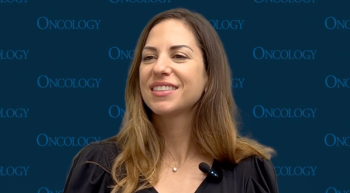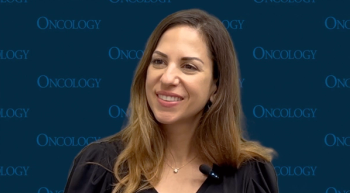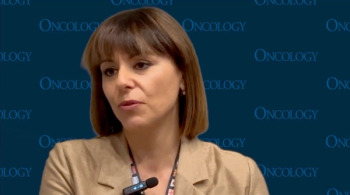
Oncology NEWS International
- Oncology NEWS International Vol 14 No 7
- Volume 14
- Issue 7
Strong Benefit for Revlimid Is Seen in Myelodysplastic Syndrome Patients With Chromosome 5q31 Deletions
ORLANDO - The thalidomide analog lenalidomide (CC-5013, Revlimid) significantly reduced the need for blood transfusions in patients with myelodysplastic syndrome (MDS) who had interstitial deletions in band 31 of the long "q" arm of chromosome 5, the most common cytogenetic abnormality in MDS, a multicenter phase II study has found. More than two-thirds of patients with 5q31 deletions achieved transfusion independence in response to the drug, and 44% had a complete cytogenetic response, Alan List, MD, reported at the American Society of Clinical Oncology 41st Annual Meeting (abstract 5).
ORLANDO The thalidomide analog lenalidomide (CC-5013, Revlimid) significantly reduced the need for blood transfusions in patients with myelodysplastic syndrome (MDS) who had interstitial deletions in band 31 of the long "q" arm of chromosome 5, the most common cytogenetic abnormality in MDS, a multicenter phase II study has found. More than two-thirds of patients with 5q31 deletions achieved transfusion independence in response to the drug, and 44% had a complete cytogenetic response, Alan List, MD, reported at the American Society of Clinical Oncology 41st Annual Meeting (abstract 5).
Lenalidomide lacks the neurotoxic and teratogenic effects of thalidomide and is 2 to 3 log more potent as a ligand modulator in MDS. It represents "the first effective therapy for this specific subtype" of the disease, said Dr. List, professor of medicine, H. Lee Moffitt Cancer Center, Tampa, Florida. Hematologic and cytogenetic responses seen in the study were "unprecedented" and appear to be durable, he added.
Up to 25% of MDS patients have 5q deletions, while the 5q-minus syndrome occurs in about 8% of MDS patients. It results from deletion of a 1.5 Mb section of chromosome 5 at region 31 to 32. While a low-risk form of MDS, it is characterized by severe hypoplastic anemia that does not respond to erythropoietin.
Study Design
The current study, MDS-003, enrolled 148 transfusion-dependent patients (ie, requiring at least 2 U of red blood cells (RBCs) in the 8 weeks prior to enrollment) with low- or intermediate-1-risk MDS and 5q31 deletions that were either isolated or accompanied by additional chromosomal abnormalities. Patients had had MDS for a median of 3.4 years and required a median of 5 U of RBCs every 8 weeks (range, 2 to 16 U); 70% had high transfusion burdens, requiring at least 2 U of RBCs per month, Dr. List said.
When the trial first began in July 2003, he said, patients received lenalidomide at 10 mg/d for 21 days of a 28-day cycle, but a few months into the study, the schedule was changed to allow continuous treatment at 10 mg/d, with doses adjusted based on tolerance. A total of 103 patients were treated at 10 mg/d continuously, and 45 were treated at 10 mg/d on the 21-day schedule.
Low-risk (n = 55) or intermediate-1-risk (n = 65) MDS was confirmed in 81% of patients; 115 patients were eligible, and 113 were evaluable at week 24.
Strong, Durable Responses
Hemoglobin levels increased by a median of 5.3 g/dL following treatment with lenalidomide. The median maximum baseline Hb level was 7.8 g/dL vs 13.4 g/dL after treatment with lenalidomide.
Transfusion independence achieved was significant and independent of treatment schedule: In an intent-to-treat analysis, among the 103 patients on lenali-domide continuously at 10 mg/d, 69% (n = 71) achieved transfusion independence vs 58% (n = 26) of the 45 patients receiving lenalidomide at 10 mg on the 21-day schedule, for an overall transfusion-independence rate of 66%; an additional 9% of patients had at least a 50% reduction in transfusions, for an overall erythroid response rate of 75%.
Median overall time to response was 4.4 weeks, and response did not differ by treatment schedule. Among the 97 patients who were transfusion-independent at week 24 in 2003, 73% remained transfusion-free upon evaluation of the database in late March 2005. With a median follow-up of 58 weeks in this group, Dr. List said, "the median duration of transfusion independence had not yet been reached but currently exceeds 47 weeks" (range, 8.6 to more than 66 weeks).
Many of the patients who experienced a hematologic response also had a cytogenetic response, he added. Cytogenetic response occurred in 70% of evaluable patients (81 of 115); complete cytogenetic response (ie, no detection of 5q deletions) was seen in 44%, and a minor response was reported in 26%. Cytogenetic pattern (karyotype complexity and deletion segment breakpoint) did not appear to be a significant factor in cytogenetic response (P = .232).
In a multivariate logistic regression analysis, absence of significant thrombocytopenia and a lower initial transfusion burden (less than 2 U of RBCs required per month) were the only significant independent determinants of erythroid and cytogenetic response.
Eleven of the 148 enrolled patients had disease progression on-study, with six progressing to acute myeloid leukemia.
Adverse Events
Overall, 80% of patients required dose adjustment during the study. Only 12% terminated treatment because of adverse events. The most common drug-related adverse events were thrombocytopenia and neutropenia, occurring at grade 3 or higher in about half of the patients. Other events (pruritus, rash, diarrhea, fatigue) were infrequent at the grade 3 level, occurring in only 2% to 3% of patients, except for rash, which was seen in 7%.
There were 15 deaths; 2 deaths (from neutropenic infectious complications) were thought to be treatment related.
NDA Accepted
In early June, Celegene Corporation announced that the FDA had formally accepted its New Drug Application (NDA) for Revlimid, as a targeted treatment for transfusion-dependent MDS with 5q deletions. The NDA submission was based primarily on the results of the trial reported at ASCO. FDA has since granted the NDA priority review.
Articles in this issue
over 20 years ago
Toremifene Cuts Ca Risk in Men With PINover 20 years ago
Sorafenib Doubles PFS in Advanced Renal Cell Caover 20 years ago
Adjuvant Letrozole Improves DFS, Compared With Tamover 20 years ago
Rituximab Plus Chemo Ups Lymphoma SurvivalNewsletter
Stay up to date on recent advances in the multidisciplinary approach to cancer.



































